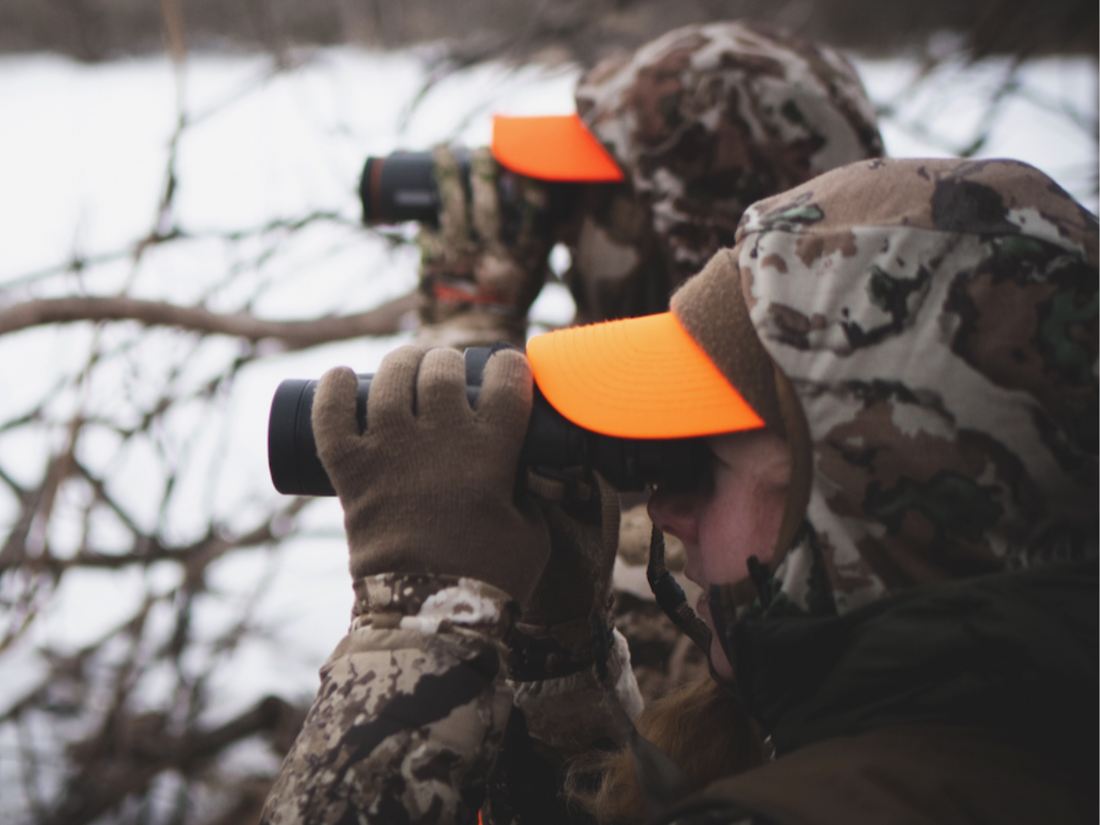By Derek Edwards
As we round the corner into winter, some people start to pack it in, or at least start complaining about the cold, damp weather and snow. But there are those of us who know better. Winter is the best season for hunting deer. If you don’t mind bundling up, almost every other part of the hunt becomes easier. In fact, winter’s the perfect time to take a beginner out on the hunt.

Spotting an Animal is Easier
A deer’s natural camouflage makes it hard to see at any point among the trees. But it’s extra hard when the ground is covered with dead leaves, and you’re straining to see movement in a sea of dull brown.
Visibility isn’t the only thing making it easier to spot a deer. The animals themselves are a lot more active, which means that they’re a lot more likely to cross your path. Movement picks up in a big way after a fresh snow. Just like humans, animals use more energy in cold weather as their bodies try to maintain temperature despite the cold. That means that they’ll need food more often.
Obviously, there are no guarantees in hunting, but a big snow can turn things around. If you can set up near a food source when a large snowfall hits—or between a bedding area and a food source—you’re likely to see a lot more movement than you otherwise would.
You get a one-two punch of easier hunting when the snow falls. Not only are deer more likely to cross your path, but they’re a lot easier to see when they do.

Tracking is Easier
A good snow cover is like training wheels for tracking an animal. The snow makes it easy to determine the size and age of the animal if you know what you’re looking for. You may even be able to tell how long ago the deer was there. Fresh tracks have sharp edges, with packed snow in the bottom of the track. Older tracks enlarge and crumble as time goes by, and the packed snow at the bottom may have started to freeze into ice. When you find a trail that looks fresh, you can start to follow it. If you don’t like the tracks you’ve found, the good news is that it won’t be long before you find another.
It isn’t just that tracks are easier to spot. The snow also makes it easier to find other signs of deer activity, like urine spots and deer scrapes. And if you’re following a blood trail, that becomes almost impossible to miss among a blanket of white.
For best results, you want to start tracking just after a 1- to 2-inch snowfall. That will cover old tracks, while fresh tracks will be clearly visible—and the snow won’t be a slog to walk through. But even if the conditions aren’t 100 percent perfect, tracking in the snow is a lot easier than tracking anywhere else.
You’re Harder to Detect
When the snow’s really pouring down, the high winds and thick precipitation make it harder for deer to spot you. Wearing white clothing can help you blend in with the snow, and pure white clothing/snow camo doesn’t cost nearly as much as traditional camouflage. But visibility isn’t your only leg up. In a blizzard, high winds carry your scent away as well as making it harder for the deer to hear you. Their disadvantages are your advantages.
It’s Easier to Haul Away Your Kill
Hauling a deer across a slippery snowbank is a lot easier than trying to drag one through grassy fields or rock-strewn forest paths. If you want to have an even easier time, you can use a sled to carry your kill. On top of that, you have fewer time constraints on bringing the animal back home—the snow turns the landscape into a natural meat freezer.

Experience a Winter Wonderland
Camping in the cold is one of the all-time underrated pleasures of the great outdoors. It’s a chance to bundle up and get cozy. Long johns, flannels, and warm coats take the sting out of the weather. When you're all bundled up, you can enjoy all that winter in the woods has to offer. The stark contrast of the dark, wet trees against a sea of white snow is one of the simplest, most beautiful sights there is.
If there’s anything you love to do at home in winter, it’s even better to do outside. There’s nothing like whipping up a hot cup of coffee in the backcountry (maybe Gundog Grind, if you feel like supporting their conservation efforts with great coffee) and taking in the view while you wait for a deer to show up.
The best thing about hunting in the winter is that there are fewer, if any, bugs to bother you. Mosquitos just aren’t a factor when it’s snowy out, which may be the biggest benefit of all.
Currently based out of California, Derek Edwards is a budding outdoorsman and adventurist. Having spent the first half of the 2010’s in western Pennsylvania where the first day of hunting season is treated as an annual holiday, he’s no stranger to strong winter snowstorms and enduring the elements.


